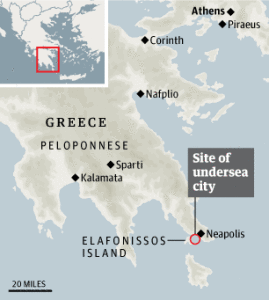Pavlopetri
Pavlopetri is the name given to a sunken Greek city off the southern Peloponnese,>discovered in 1904 by geologist Phocian Negris and rediscovered as recently as 1967 by Nicholas Flemming.<An Anglo-Greek team of archaeologists have  dated the remains to between 2800 and 1200 BC and as such are referring to it as the oldest (known) submerged city in the world(a)(b). This dating places it before the time of Plato and so it did not take long for commentators to suggest that it was possibly the inspiration behind aspects of Plato’s Atlantis narrative. However, the number of known submerged cities in the Mediterranean has been numbered at around 200. Every time one is discovered there is usually an attempt made to associate it with Atlantis, which fades when it is realised that it fails to match many of the other descriptive identifiers noted by Plato.
dated the remains to between 2800 and 1200 BC and as such are referring to it as the oldest (known) submerged city in the world(a)(b). This dating places it before the time of Plato and so it did not take long for commentators to suggest that it was possibly the inspiration behind aspects of Plato’s Atlantis narrative. However, the number of known submerged cities in the Mediterranean has been numbered at around 200. Every time one is discovered there is usually an attempt made to associate it with Atlantis, which fades when it is realised that it fails to match many of the other descriptive identifiers noted by Plato.
What I find interesting about Pavlopetri is that apparently it is never referred to in any classical Greek literature. Sceptics often claim that the reality of Plato’s Atlantis is undermined by the fact that Plato is the only ancient author to mention it and yet, Pavlopetri, unknown until the last century, does exist without any known written reference to it!
An October 2011 BBC documentary City Beneath the Waves Pavlopetri revealed that the port city was more extensive than originally thought and that it traded with other Aegean states particularly the Minoans on Crete.
(a) https://www.guardian.co.uk/science/2009/oct/16/lost-greek-city-atlantis-myth
(b) https://www.sciencedaily.com/releases/2009/05/090512093635.htm
